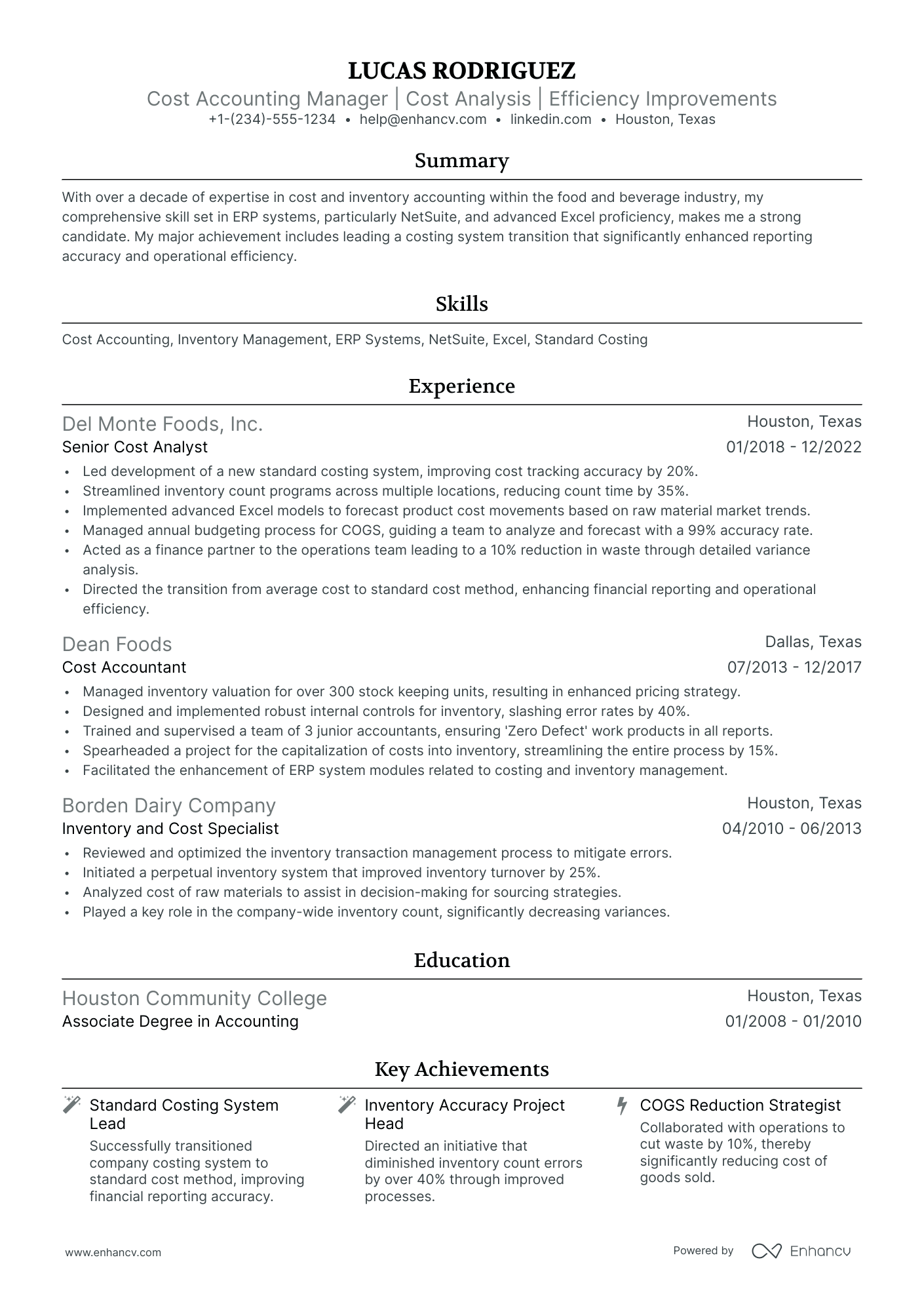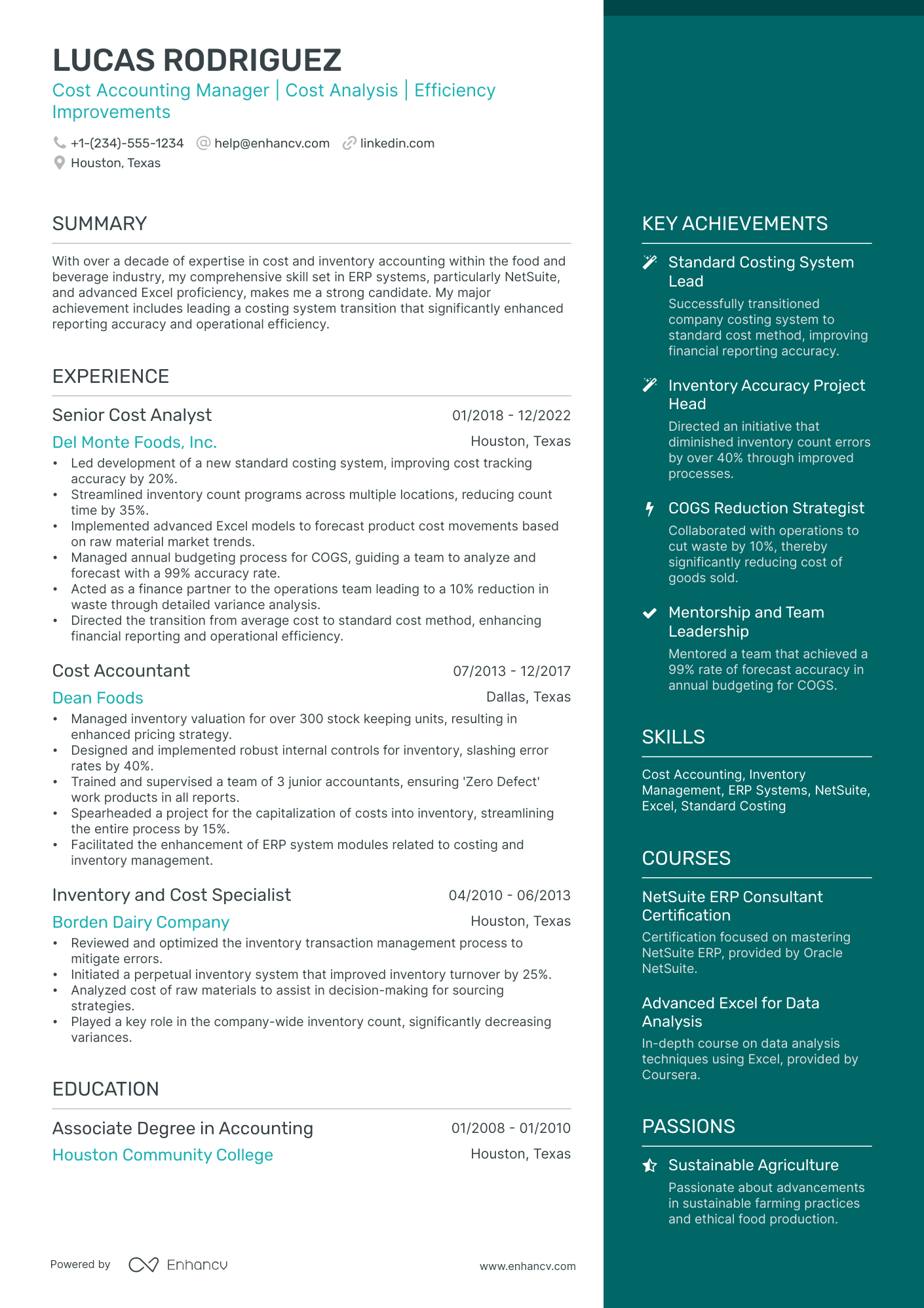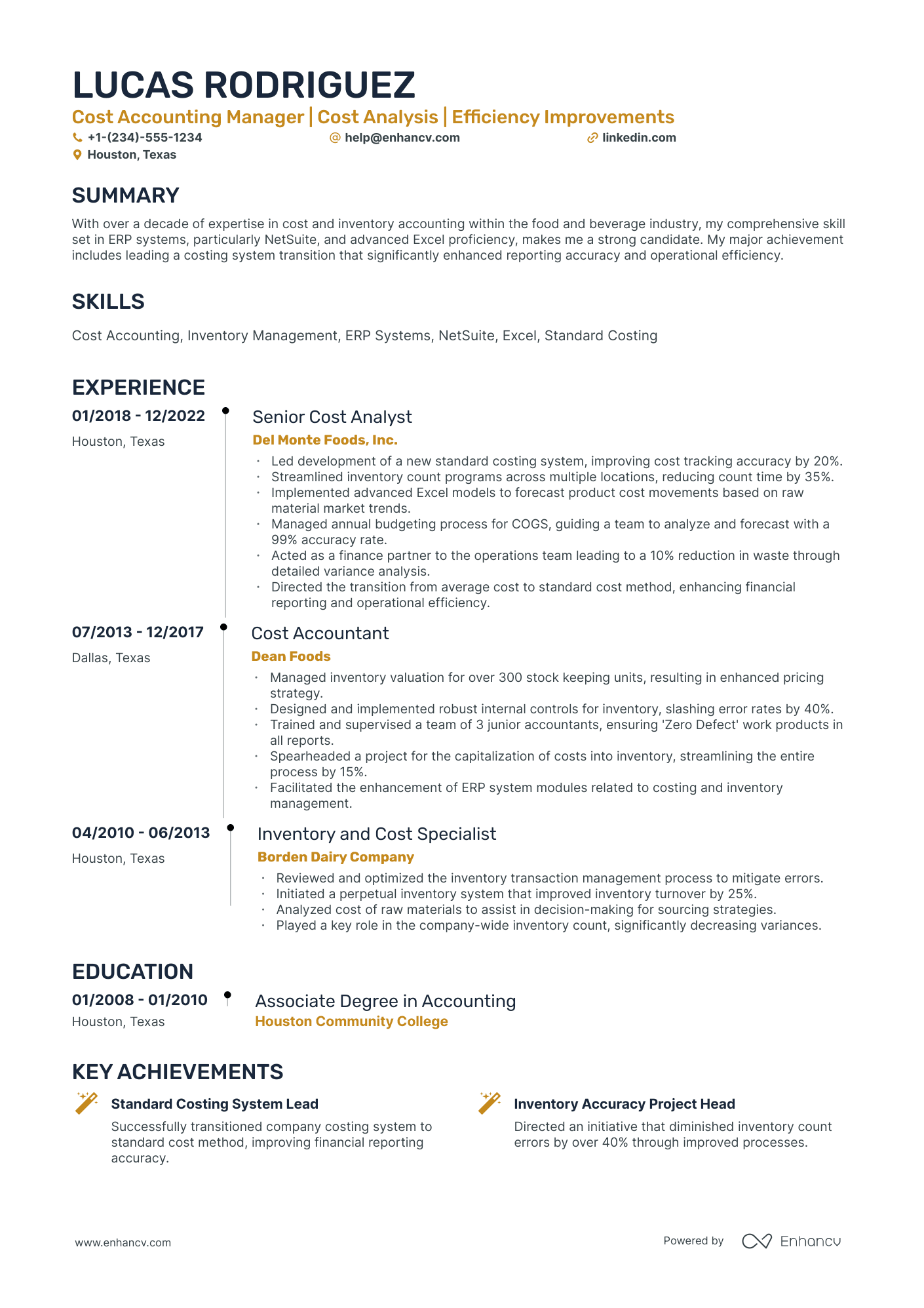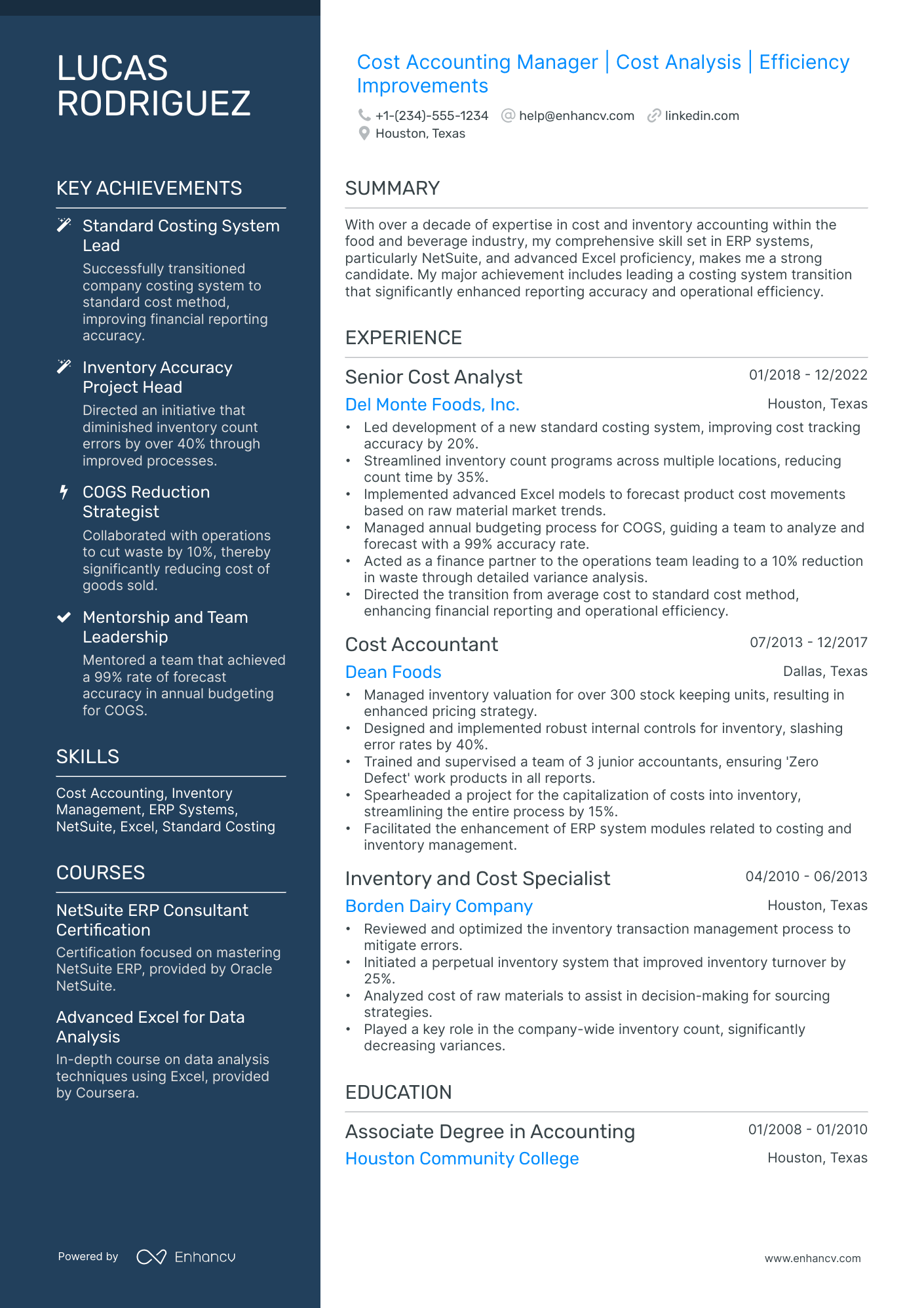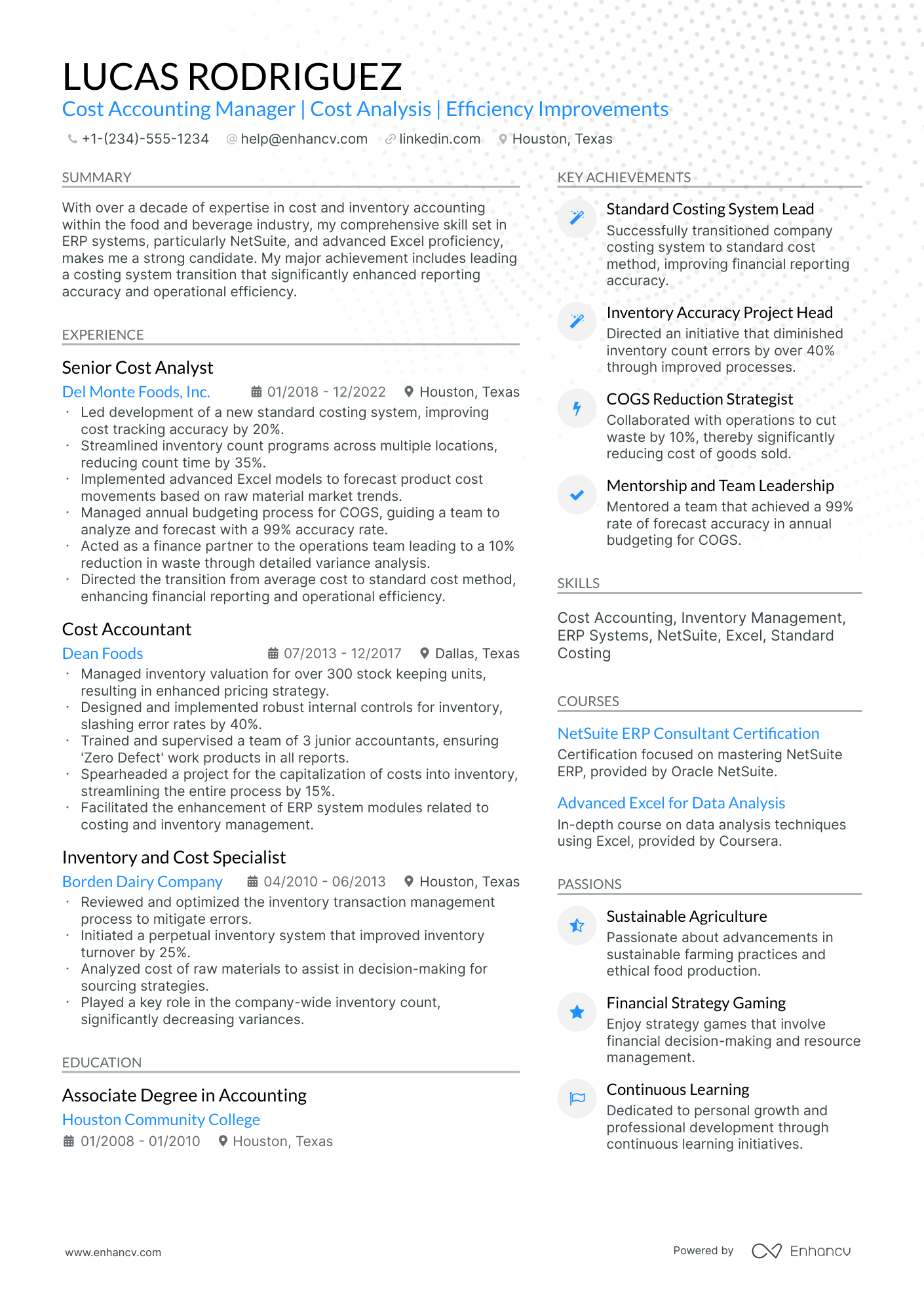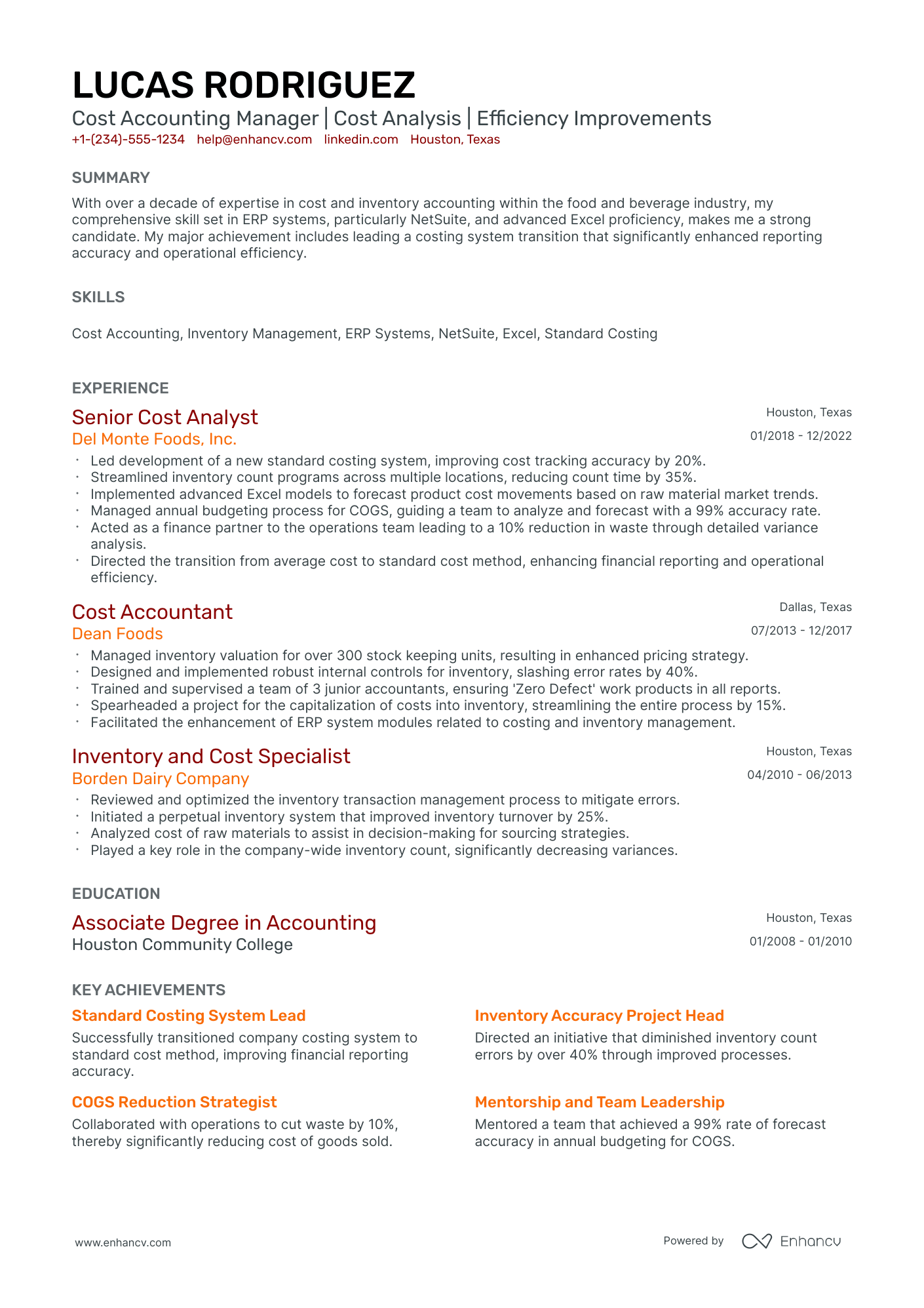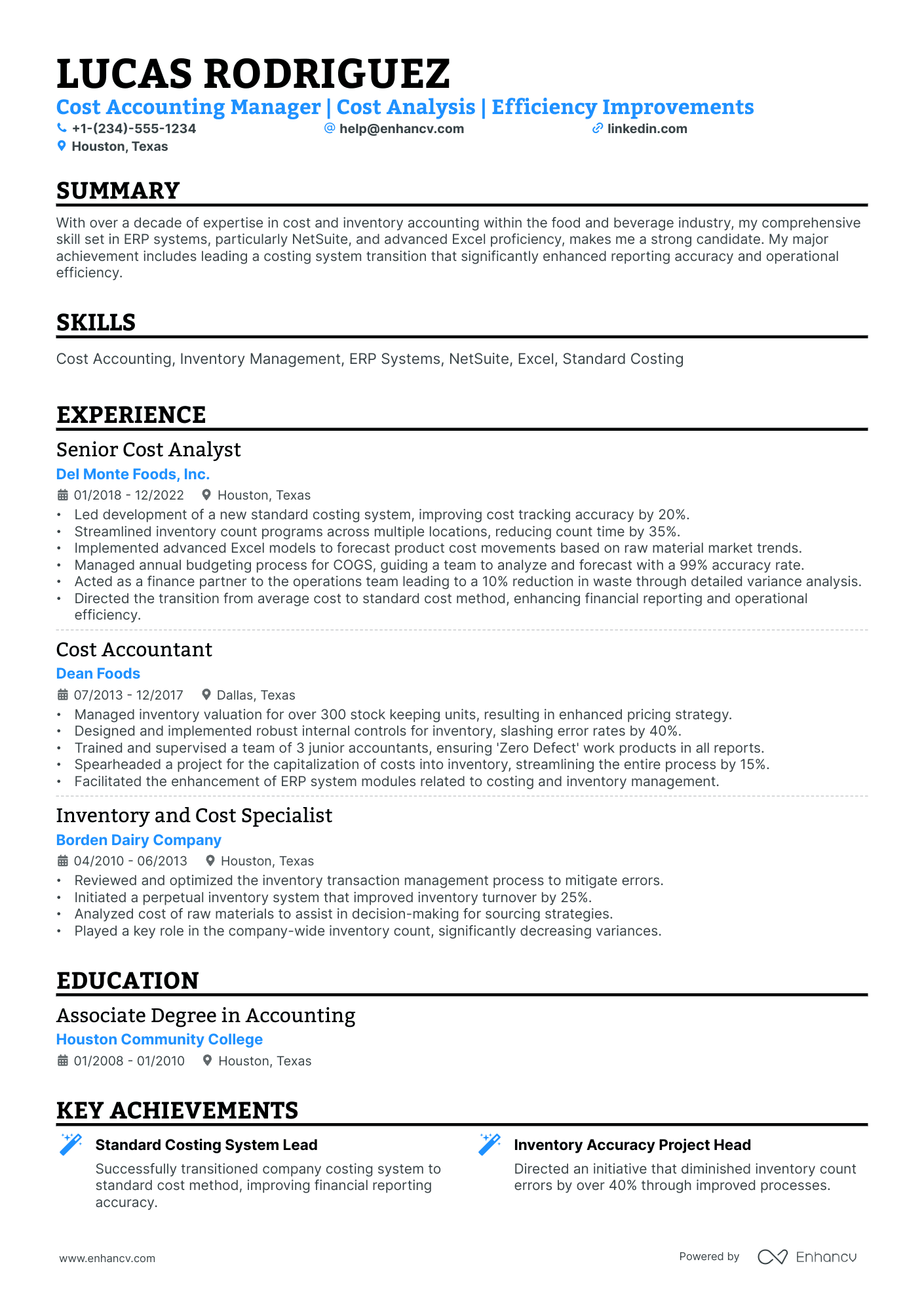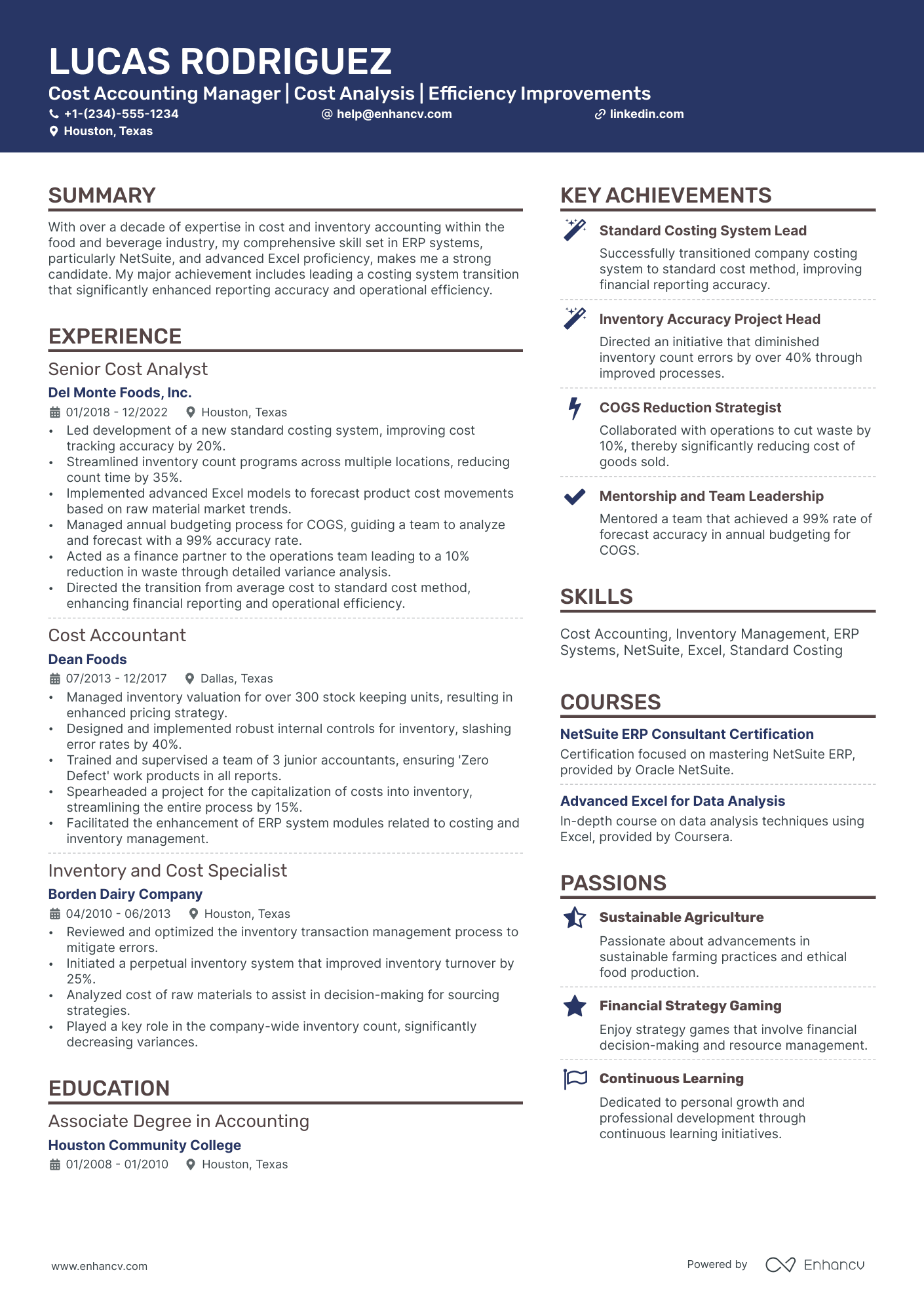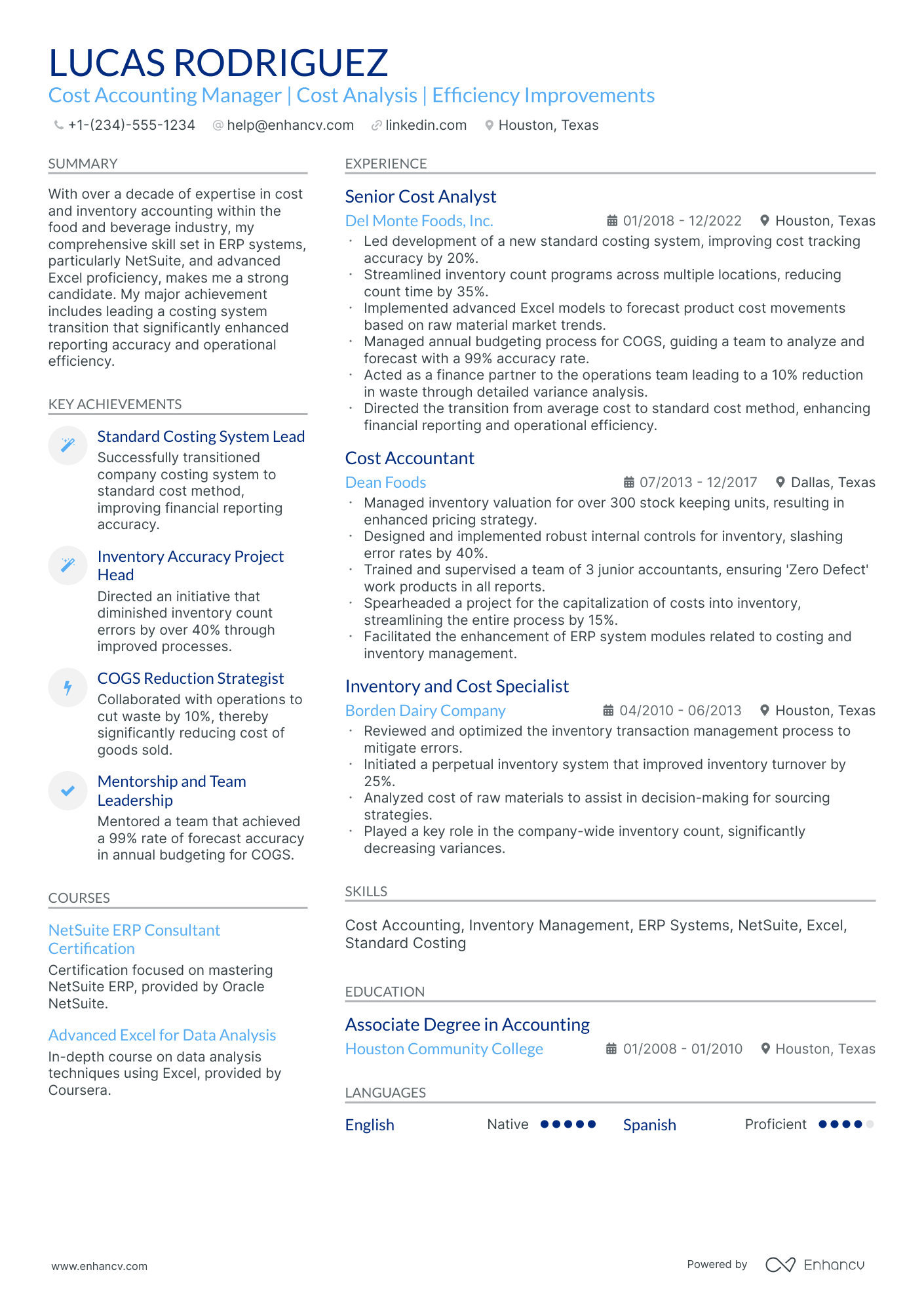As a cost accountant, articulating the complexity of your role and demonstrating your financial acumen can be particularly challenging on a resume. Our expert-crafted guide is tailored to help you navigate this challenge, ensuring that your resume showcases your analytical prowess and cost management successes with clarity and impact.
- Utilize real-life examples to refine your cost accounting resume;
- Effectively write the experience section of your cost accounting resume, even if you have minimal or no professional experience;
- Incorporate the industry's top 10 essential skills throughout your resume;
- Include your education and certifications to highlight your specific expertise.
If the cost accounting resume isn't the right one for you, take a look at other related guides we have:
- Junior Financial Analyst Resume Example
- Finance Officer Resume Example
- Construction Accounting Resume Example
- Account Executive Resume Example
- Business Analyst Accounting Resume Example
- Financial Reporting Manager Resume Example
- Finance Executive Resume Example
- Personal Banker Resume Example
- Commercial Banking Resume Example
- Financial Data Analyst Resume Example
Cost accounting resume format made simple
You don't need to go over the top when it comes to creativity in your cost accounting resume format .
What recruiters care about more is the legibility of your cost accounting resume, alongside the relevancy of your application to the role.
That's why we're presenting you with four simple steps that could help your professional presentation check all the right boxes:
- The reverse-chronological resume format is the one for you, if you happen to have plenty of relevant (and recent) professional experience you'd like to showcase. This format follows a pretty succinct logic and puts the focus on your experience.
- Keep your header simple with your contact details; a headline that details the role you're applying for or your current job; and a link to your portfolio.
- Ensure your resume reaches an up-to-two-page limit, only if you happen to be applying for a more senior role or you have over a decade of relevant experience.
- Save your cost accounting resume as a PDF to retain its structure and presentation.
Customize your resume for the market – a Canadian format, for example, might vary in structure.
Upload & Check Your Resume
Drop your resume here or choose a file. PDF & DOCX only. Max 2MB file size.
PRO TIP
The more time and effort you've put into obtaining the relevant certificate, the closer to the top it should be listed. This is especially important for more senior roles and if the company you're applying for is more forward-facing.
The key to your cost accounting job-winning resume - present your expertise with these sections:
- A header to make your resume more scannable
- Snapshot of who you are as a professional with your resume soft skills, achievements, and summary or objective
- Job advert keywords in the skills section of your resume
- Resume experience quantifying your past job successes with metrics
- A relevant education, certification, and technical sills section to provide background to your technological/software capabilities
What recruiters want to see on your resume:
- Proficiency with cost accounting systems and databases such as SAP, Oracle, or QuickBooks.
- Experience in cost analysis, reporting, and forecasting within manufacturing or relevant industries.
- Strong understanding of Generally Accepted Accounting Principles (GAAP) and cost accounting standards.
- Demonstrable ability to develop and maintain standard costing systems, conduct variance analysis, and perform margin and profitability analysis.
- CPA or CMA certification or relevant coursework in cost accounting or managerial accounting.
Advice for your cost accounting resume experience section - setting your application apart from other candidates
Your resume experience section needs to balance your tangible workplace achievements with job requirements.
The easiest way to sustain this balance between meeting candidate expectations, while standing out, is to:
- Select really impressive career highlights to detail under each experience and support those with your skills;
- Assess the job advert to define both the basic requirements (which you could answer with more junior roles) and the more advanced requirements - which could play a more prominent role through your experience section;
- Create a separate experience section, if you decide on listing irrelevant experience items. Always curate those via the people or technical skills you've attained that match the current job you're applying for;
- Don't list experience items from a decade ago - as they may no longer be relevant to the industry. That is, unless you're applying for a more senior role: where experience would go to demonstrate your character and ambitions;
- Define how your role has helped make the team, department, or company better. Support this with your skill set and the initial challenge you were able to solve.
Take a look at how real-life cost accounting professionals have presented their resume experience section - always aiming to demonstrate their success.
- Developed and maintained standard costing models for over 150 products, ensuring accurate cost information for pricing decisions leading to a 5% increase in gross margins.
- Partnered in cross-functional teams to analyze and reduce manufacturing waste by 20%, resulting in annual savings of $1.2 million.
- Implemented a new cost accounting system which improved month-end close efficiency by three days and increased reporting accuracy.
- Managed a project to revise the overhead allocation methodology which reduced cost variances by 30%.
- Led quarterly budget review meetings, identifying trends and making recommendations that resulted in a 10% reduction in departmental costs.
- Conducted in-depth profitability analyses for new product lines which contributed to a strategic shift in production focus, boosting profit margins by 7%.
- Streamlined inventory counting processes using ABC analysis, which improved cycle count accuracy to 98%.
- Provided detailed variance analysis reports monthly, aiding in uncovering a critical pricing error that saved the company $500,000 annually.
- Collaborated with the supply chain department to optimize vendor selection, enhancing the cost-benefit balance and contributing to a 15% reduction in material costs.
- Reviewed and improved the labor costing system, providing more precise job costing data that increased bid accuracy by 25%.
- Executed detailed cost forecasts for upcoming fiscal years, influencing the strategic planning process and leading to more informed investment decisions.
- Initiated a cost reduction program across all product lines that cut costs by $850,000 within the first fiscal year.
- Conducted monthly, quarterly, and annual inventory valuations which consistently aligned within a 2% margin of actual inventory audits.
- Coordinated with production teams to review and adjust standard costs yielding an increase in accuracy for product margin analysis.
- Spearheaded a cost-transparency initiative for the company’s flagship product line, leading to a 5% price increase that was well-received by customers due to improved communication.
- Directed the development of a complex cost monitoring system for large-scale construction projects that enhanced forecast precision by 20%.
- Collaborated with engineering to reassess production processes which resulted in the identification of a $3 million cost-saving opportunity.
- Facilitated the transition from a traditional cost accounting setup to an integrated activity-based costing model, allowing the company to trace and manage costs more effectively.
- Negotiated with suppliers and revised procurement contracts leading to an immediate 8% cost reduction in raw materials without compromising quality.
- Implemented and managed job-costing for bespoke customer projects, which increased the pricing accuracy and contributed to a 6% rise in customer satisfaction scores.
- Orchestrated the annual cost roll-up process ensuring that updated labor and overhead rates were accurately reflected in the system, in turn providing a reliable basis for management decision-making.
- Provided financial analysis that supported the launch of a new product line generating $5 million in new revenue in its first year.
- Optimized the expense management process through a comprehensive review and restructuring, achieving a 12% reduction in operating costs over two years.
- Drove a cost mitigation plan in response to increased commodity pricing, which involved process re-engineering and saved the company $2 million annually.
Quantifying impact on your resume
- Detail the percentage reduction in overhead costs you achieved through strategic cost-cutting measures.
- Highlight the amount of money saved through improved inventory management and waste reduction.
- Specify the budget size you have managed to underscore financial responsibility and trust levels.
- Illustrate the efficiency improvements in cost reporting by noting the reduction in time taken to close the monthly books.
- Document any direct impact on profitability by quantifying the contribution margin improvements.
- Capture the scale of projects undertaken by citing the total value of cost analysis projects led.
- Showcase your forecasting accuracy by including percentage variance between forecasted and actual costs.
- Mention the number of cost control initiatives executed to demonstrate project management skills.
Action verbs for your cost accounting resume
What if you don't have any experience?
There are two very common scenarios about candidates with less experience. They are either:
- Fresh out of college in search of a cost accounting role
- Transferring over from a completely different field
Both of these types of candidates still have a shot at landing their first job in the industry.
All they need to do about the experience section of their cost accounting resume is:
- Consider their strengths - would the outcomes of their previous roles or niche skill sets impress recruiters? Feature those towards the top of your resume
- Exclude any and all irrelevant experience items - remember that at the end of the day, you're telling a story that aims to align with the ideal candidate for the cost accounting job
- Win recruiters over with personality - perhaps your ambition, dreams, and diligence would make you the perfect fit for the cost accounting role. Dedicate resume space to detail your personality traits by showcasing how they've helped you succeed in past roles
- Tailor your experience to specific job requirements - ensure your cost accounting resume answers the advert in the best way possible.
Recommended reads:
PRO TIP
Bold the names of educational institutions and certifying bodies for emphasis.
Cost accounting resume skills: the essential hard skills and soft skills checklist
Ultimately, your cost accounting resume should hint to recruiters that you possess an array of talents that are indispensable to the role.
For example, listing the technologies and software you're apt at using (or your hard skills) and how you apply them in your day-to-day responsibilities would ensure you meet the technical requirements of the role.
But is this enough to ensure that you make a good impression on recruiters?
Go a step further by detailing the soft skills or personality traits you've attained thanks to your work and life experience.
The best way to balance hard skills and soft skills on your cost accounting resume is by:
- Highlighting up to three of your most noteworthy career accomplishments in a separate section.
- Listing at least one hard skill and one soft skill you've used to solve a particular challenge or problem.
- Feature niche skills and technologies that would help you stand out amongst candidates.
- Think back on the social impact your efforts have had towards improving the work environment - were you able to always maintain a professional ethic, while enhancing the team culture? Write about your contribution to the role, department, or organization itself as a metric of success.
The skills section of your resume provides you with plenty of opportunities to detail your technical and personal traits.
All you have to do is select the talents that best fit your application and expertise. Make note of some of the most prominent hard and soft skills across the industry from our list:
Top skills for your cost accounting resume:
Cost Accounting Software (e.g., SAP, Oracle)
Excel (Advanced Functions & Pivot Tables)
Financial Analysis Tools
Budgeting Software
Data Analysis Tools (e.g., Tableau, Power BI)
ERP Systems Knowledge
Accounting Software (e.g., QuickBooks, Sage)
Forecasting Techniques
Variance Analysis
Internal Controls and Compliance
Analytical Thinking
Attention to Detail
Problem-Solving
Communication Skills
Time Management
Team Collaboration
Adaptability
Critical Thinking
Organizational Skills
Ethical Judgment
PRO TIP
If you failed to obtain one of the certificates, as listed in the requirements, but decide to include it on your resume, make sure to include a note somewhere that you have the "relevant training, but are planning to re-take the exams". Support this statement with the actual date you're planning to be re-examined. Always be honest on your resume.
What are the best certificates to add to your cost accounting resume + how to curate your education section
The education and certification resume sections are the underdogs of your cost accounting resume.
They showcase to recruiters that you've invested plenty of time to gain valuable and specific know-how, vital for growth.
As far as the resume education section is concerned:
- Detail only advanced education, specifying the institution and timeframe.
- Indicate your forthcoming graduation date if you're in the midst of your studies.
- Consider omitting degrees that don't align with the job's requirements.
- Offer a description of your academic journey if it underscores your notable achievements.
When curating your degrees and certificates on your cost accounting resume:
- Select only accreditation that matters to the role
- Niche knowledge that could help you stand out as a candidate (as is within the past few years), should be listed towards the top of your resume
- Include any pertinent data for credibility (e.g. institute name, graduation dates, etc.)
- Irrelevant degrees and certifications shouldn't make it on your resume. Those include your high school diploma and any specializations that have nothing to do with the technical or soft skills that are required for the job
As a final note, if you feel tempted to exclude your education or certification from your resume, don't.
These two sections could help you have a better competitive edge over other candidates - hinting that your professional journey in the industry may be for a longer period of time.
Recruiters find all of these cost accounting credentials impressive:
The top 5 certifications for your cost accounting resume:
- Certified Management Accountant (CMA) - Institute of Management Accountants (IMA)
- Certified Public Accountant (CPA) - American Institute of Certified Public Accountants (AICPA)
- Chartered Global Management Accountant (CGMA) - Association of International Certified Professional Accountants (AICPA & CIMA)
- Certified Cost Professional (CCP) - Association for Advancement of Cost Engineering (AACE International)
- Certified Internal Auditor (CIA) - Institute of Internal Auditors (IIA)
PRO TIP
Bold the names of educational institutions and certifying bodies for emphasis.
Recommended reads:
Choosing between a cost accounting resume summary or objective
Many may argue that, in recent times, the cost accounting resume summary or objective has become completely obsolete.
But the reality is different as both of these resume sections provide you with an opportunity to :
- integrate cost accounting-vital keywords
- showcase your accomplishments
- answer why you're applying for this particular role.
The difference (between the summary and the objective) is that the:
- Resume objective puts your career goals in a more prominent position.
- Resume summary focuses more on career milestones.
We recommend you select the summary if you happen to have plenty of experience you'd like to spotlight from the very start of your cost accounting resume.
Meanwhile, the objective is ideal for those candidates who'd like to further prove their suitability for the role with their goals and soft skills.
We've featured some industry professional cost accounting resume samples to the best resume summary and objective structures:
Resume summaries for a cost accounting job
- Seasoned Cost Accountant with over 10 years of experience in manufacturing industries, skilled in implementing cost-saving measures, reducing waste by 20%. Expert in standard costing, variance analysis, and budgeting, adept at GAAP standards. Spearheaded a cross-departmental budget revision process, optimizing resources and increasing profitability by 30% at XYZ Corp.
- Financial Analyst transitioning to cost accounting with a keen analytical acumen cultivated over 5 years at DEF Bank. Proficient in financial modeling, data analysis, and forecasting. Holds an MBA with a focus on financial management and eager to apply financial expertise to streamline cost control processes within a manufacturing environment.
- Diligent CPA with a strong foundation in auditing seeking to leverage 7 years of experience into cost accounting. Demonstrates a comprehensive understanding of cost behavior, cost systems, and efficiency enhancing strategies. Facilitated a robust internal audit at GHI Company which led to the recovery of $500,000 in misallocated funds.
- Professional with an extensive background in project management aiming to transition into cost accounting. Possesses a Bachelor's in Accounting and a proven track record of delivering projects under budget. Acquired solid problem-solving skills and financial acumen over 8 years in the construction industry, keen to optimize cost systems and contribute to financial planning.
- Aiming to begin a career in cost accounting, bringing forth a fresh perspective, strong quantitative skills, and a Bachelor’s degree in Accounting. Excited about the opportunity to assist in developing precise cost analysis models that drive organizational cost efficiency. Committed to diligently working towards professional certifications to contribute substantially to cost management initiatives.
- Recent finance graduate with a passion for accounting, eager to embark on a cost accounting career path. Equipped with theoretical knowledge of cost structures, a knack for data analysis, and a commitment to pursue ongoing learning. Motivated to utilize my skills to identify cost-saving opportunities and to assist in the implementation of strategic financial solutions.
Optimize your resume summary and objective for ATS
Drop your resume here or choose a file.
PDF & DOCX only. Max 2MB file size.
Recruiters' favorite additional cost accounting resume sections
When writing your cost accounting resume, you may be thinking to yourself, " Is there anything more I can add on to stand out? ".
Include any of the below four sections you deem relevant, to ensure your cost accounting resume further builds up your professional and personal profile:
Key takeaways
Securing your ideal job starts with crafting a compelling cost accounting resume. It should not only highlight your professional strengths but also reflect your personality. Key aspects to remember include:
- Choose a clear, easily editable format, allowing more time to focus on the content of your resume;
- Emphasize experience relevant to the job, focusing on your impact on the team;
- Opt for a resume summary if you have extensive professional experience, and a resume objective if you're just starting out;
- Include technical skills in the skills section and interpersonal skills in the achievements section;
- Recognize the importance of various resume sections (e.g., My Time, Projects) in showcasing both your professional abilities and personal traits.
